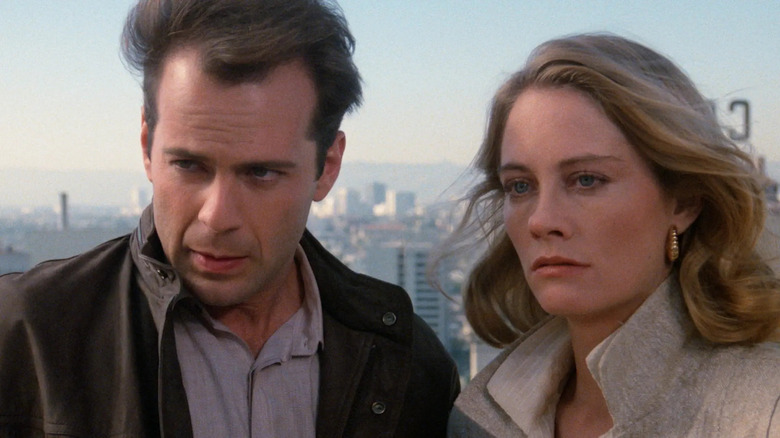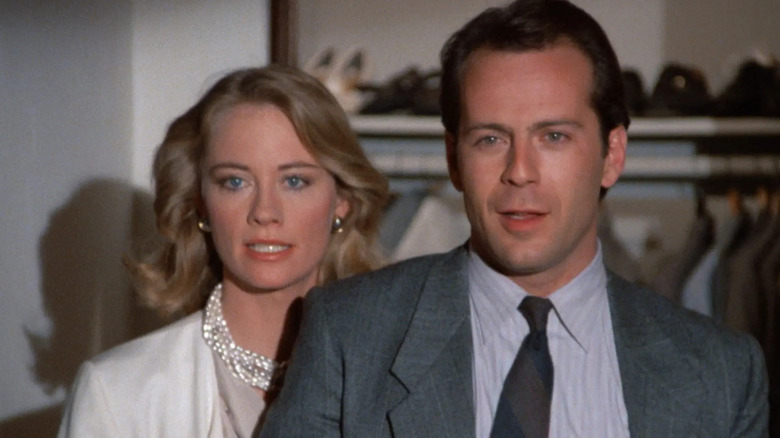Why The Classic Bruce Willis TV Series Moonlighting Was Canceled
Until Hulu did the lord's work and brought back Glenn Gordon Caron's "Moonlighting" last year, the series that launched Bruce Willis' career and solidified Cybill Shepherd's had been languishing for seemingly ages in a digital netherworld where its fans could not access it and potential newcomers had zero chance of discovering it. This would've been unthinkable during the show's 1985-1987 heyday, when the live-wire romantic chemistry of its leads and the inventive mystery plotting of Caron and his writers — who once plunged their "Moonlighting" protagonists into a Shakespearian reverie — made it must-see television. "Moonlighting" was hilarious, smart and ridiculously sexy.
And just as fast as it peaked, it was gone.
While the rerelease of "Moonlighting" on Hulu confirmed that it was every bit as fresh and funny as we remembered, bringing it all back meant revisiting its untimely demise. How could a show with two dynamic leads who generated wild sparks on-screen lose its way so quickly? There's a conventional wisdom that's set in over the years about the cancelation of the show, and I've probably repeated it myself. But the conventional wisdom is totally bunk. The series' self-created problem wasn't unnavigable. There were two circumstances beyond anyone's control that complicated the run of "Moonlighting," and the truth is that the writers were forced to turn the show into something it was probably never meant to be.
Maddie and David's long-awaited hook-up did not kill Moonlighting
At the end of the show's third season, in the episode "I Am Curious... Maddie," Caron finally answered the question viewers had been asking since its premiere: will they or won't they? As most probably expected, the crackling sexual attraction between Blue Moon Detective Agency partners Maddie Hayes and David Addison got good and consummated (as The Ronettes' "Be My Baby" blasted in the background). It was a terrific episode, one that led to a predictable reckoning for both characters. Had this perpetually squabbling duo just made a terrible mistake?
This left viewers asking a new question, one that isn't optimal for any series no matter how swimmingly everything seems to be going: will the show work anymore?
There was a logical answer to this question, but Caron was frustratingly unable to deliver it. The transition should've been easy: "Moonlighting" had been cribbing from the William Powell and Myrna Loy film series based on Dashiell Hammett's novel "The Thin Man" from the start, so now David and Maddie could just get married like Nick and Nora and continue to bicker while solving mysteries.
Alas, life got in the way. For Shepherd, it was pregnancy; she was expecting twins, who would be born during the series's fourth season. For Willis, it was movie stardom; he got paid $5 million to shoot up terrorists in "Die Hard," and to the surprise of most in Hollywood, he pulled it off.
The difficulties of season 4 were pre-stardom for Willis. He was off shooting the movie, which made it hard to get him together with the pregnant Shepherd, so the show's writers took the dicey approach of sending their characters off on separate adventures. This proved awkward, and, eventually, deadly to the series' rom-com charm. We watched "Moonlighting" to see its two stars together.
Once "Die Hard" blew up, Willis' availability became even more of an issue, which led to production delays and, finally, cancellation after the show's fifth season. Five seasons is a good run for any series, but those last two (which I like more than most) should've been "The Thin Man," and I hate that life had other plans for the principals. In any event, that's why "Moonlighting" got canceled.

